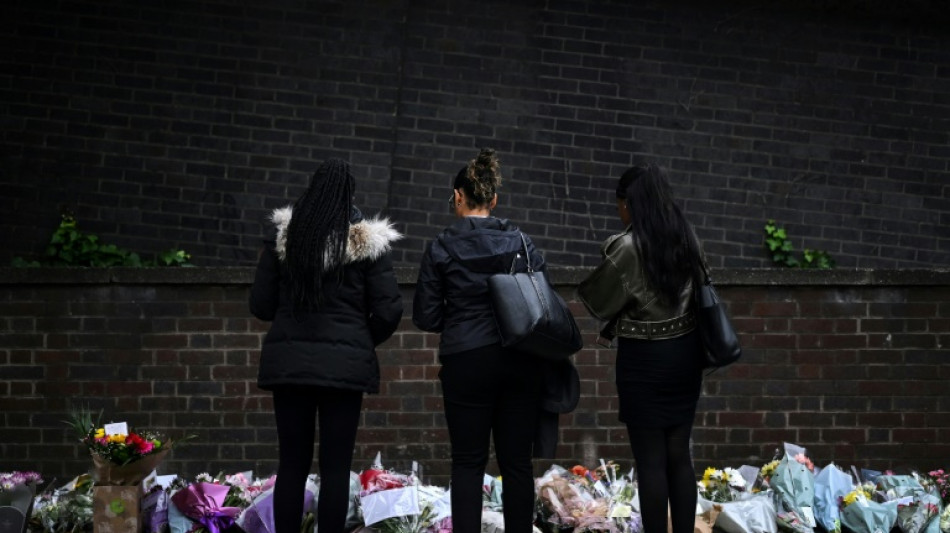

Deadly teen knife crisis UK's 'new normal'
Recruited at the age of eight by a drugs gang, Rhys was part of Britain's violent knife crime "crisis" until his best friend was fatally stabbed and died in his arms.
"Another of my friends drowned in a river, another got stabbed, another got acid thrown over them. Another was shot twice," Rhys, who is now 28, told AFP.
The turning point for Rhys, who now works to educate children about the dangers of knives, drugs and gangs, came a decade ago when his best friend, then 17, staggered to his house after being knifed in the street.
"I had my fingers in his chest and everything trying to stop the blood," he told AFP.
Britain is in the midst of a teenage knife crime epidemic that Prime Minister Keir Starmer has branded a "national crisis".
Incident after incident reveals a horrifying knife culture in which young people who are little more than children lose their lives, often at the hands of others of the same age.
Cases of mistaken identity, trivial insults, drug gang turf wars or just pure criminality can all trigger tragic consequences.
- Killed for a teddy bear -
Knife crime in England and Wales has been steadily rising since 2011, according to official government data.
Excluding the northern city of Manchester, in the year ending June 2024, there were 50,973 offences involving a sharp instrument compared to 36,000 in the year ending March 2011 -- a 41 percent increase.
Figures for national deaths from stabbings are hard to find. But 10 teenagers died in stabbings in London last year and 18 in 2023, the Metropolitan Police told AFP.
Among them was 15-year-old Elianne Andam, described by her family as full of "hopes and dreams for the future", who died in September after being stabbed in the neck with a kitchen knife on her way to school.
The "bright and funny" schoolgirl was murdered by her friend's 17-year-old ex-boyfriend after the pair rowed over returning a teddy bear.
On Thursday, Axel Rudakubana, 18, was sentenced to life in custody and ordered to serve a minimum of 52 years for stabbing to death three young girls and attempting to murder 10 other people at a July dance class in Southport, northwest England.
Earlier this month, Kelyan Bokassa, 14, became the first victim of 2025, slashed 27 times with a machete on a bus in front of horrified passengers.
"It feels like a war zone," his mother Marie Bokassa, said. Two boys, aged 15 and 16, have been charged with his murder.
On Tuesday, Leo Ross, 12, -- described by his family as "funny and sweet" -- died after being stabbed walking through a park in the central city of Birmingham. A 14-year-old has been arrested on suspicion of his murder.
Police have warned for over a decade now that drugs gangs have been extending their operations outside London and other major cities.
In largely rural Avon and Somerset in southwest England, sharp instrument offences were up 32 percent in the year to June 2024, the anti-knife crime Ben Kinsella Trust said, citing government statistics.
In a chilling case in Wolverhampton, near Birmingham, two 12-year-olds last year became Britain's youngest knife murderers.
They were convicted of killing an 18-year-old stranger, Shawn Seesahai, with a machete after he asked them to move from a park bench.
- Children killing children -
A nationwide ban on "zombie" style knives with blades of more than eight inches (20 centimetres) was introduced in September.
But London Metropolitan University criminologist James Alexander, who studies blade crime, said children killing children was now the "new normal".
He traces the situation in London to housing estates in deprived areas.
For "survival", anyone living on an estate was required "to show they can be violent, that they can carry a knife... so other people know they ... shouldn't be messed with", he said.
As community ties weakened and the drugs trade mushroomed over the past two decades, he said, young people have become estranged from neighbours and extended family members who might previously have acted as informal mentors.
The head of London's Met Police, Mark Rowley, has said he fears knife crime is becoming "normalised" because it is dismissed as gang crime that won't affect most people.
Increasingly, however, young people with no previous links to drugs or gangs are getting caught up in the violence.
In a case of mistaken identity a year ago in western Bristol, childhood friends Mason Rist, 15 and Max Dixon, 16, who had gone out for a pizza were chased and knifed to death.
Reformed knife carrier Rhys now works as a mentor for the charity Escapeline educating children on how gangs groom young people -- befriending them, showering them with money and gifts before reeling them in and threatening their family if they try to leave.
"There's a lot of will to do things but to break the new normal it's going to require a lot of resources and a lot of people changing their view about what to do," Alexander added.
har/jkb/phz
L.Majerus--LiLuX



